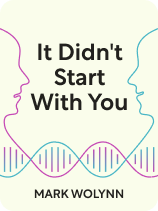

This article is an excerpt from the Shortform book guide to "It Didn't Start With You" by Mark Wolynn. Shortform has the world's best summaries and analyses of books you should be reading.
Like this article? Sign up for a free trial here .
What is the best therapy for trauma? Do you want to try a more traditional approach or something more unconventional?
There are many ways to resolve your trauma symptoms in therapy. In his book It Didn’t Start With You, Mark Wolynn talks about two different methods of conducting trauma-based therapy: language-based approach and psychedelic-assisted therapy.
Keep reading to learn about the best therapy for healing trauma, according to Mark Wolynn.
A Language-Based Therapeutic Approach to Trauma
Wolynn asserts that how we talk about the things that cause us emotional or physical pain can lead us to the source of our trauma. He claims that his language-based approach is the best therapy for trauma because it involves asking people a series of questions and listening closely to their answers. Words and phrases that seem particularly impassioned, peculiar, or misplaced serve as beacons indicating that some trauma lies hidden below their awareness. Sometimes investigating our direct life experiences can reveal the source of the trauma, but other times we must trace the source back to prior generations. Wolynn argues that his therapeutic approach can produce results where traditional talk therapy and medication cannot.
The Effectiveness of Talk Therapy and Medication
Wolynn says that his language-based therapy can resolve trauma symptoms where traditional talk therapy and medication often cannot. To support his claim, he provides many anecdotal accounts of patients who have successfully resolved deep traumas using his approach. However, he doesn’t provide any solid data to compare the effectiveness of his approach to other treatment strategies. What does research show about the effectiveness of talk therapy and medication? Do they indeed fall short in resolving trauma symptoms?
Most medical professionals agree that medication alone is not the best therapy for trauma because it can’t heal trauma, but it can help alleviate symptoms such as insomnia, depression, and anxiety. Some research shows that talk therapy can significantly improve the mental health of patients with serious mental health challenges such as anxiety and depression. That research also shows that talk therapy can produce measurable changes in the brain that support people’s recovery and prevent relapse.
Further, research shows that some forms of talk therapy are more effective than others in treating trauma. The three approaches that seem most effective are prolonged exposure, cognitive processing therapy, and trauma-focused cognitive-behavioral therapy (CBT). Each of these treatments directly addresses patients’ thoughts, feelings, and memories linked to their trauma. In CBT, for example, treatment techniques include having patients write about their traumatic experience, reading that narrative out loud, teaching them to distinguish “then versus now” when trauma symptoms surface, and reassessing beliefs about themselves and the world. In contrast, treatments that aim to reduce trauma symptoms through less direct means—such as relaxation exercises—are less effective.
However, others contend that talk therapy and medication are only moderately effective. They claim that the benefits of these treatments have been overstated, largely due to a “publication bias” in medical literature that favors hopeful findings.
The Logic Behind Language-Based Trauma Therapy
Now that you understand Wolynn’s therapeutic approach, let’s look at research that underscores why language clues are effective in healing trauma, making it the best therapy for trauma.
Wolynn explains that traumatic experiences compromise our ability to recall and process memories, which keeps us captive to their effects. Here’s why this happens: Some trauma is too difficult for us to process, like an unexpected death in the family, a miscarriage, or being in a war zone. When the trauma hits, our bodies go into survival mode. This causes our minds to go blank—not just at the moment but also later when we try to describe what happened. We just can’t find our words.
Bessel van der Kolk, a Dutch psychiatrist and author of The Body Keeps the Score, has done extensive research showing that trauma blunts the parts of our brain that control speech and allow us to stay present at the moment. This diminishes our ability to accurately recall what happened.
But, Wolynn explains, traumatic memories don’t vanish. They get stored—in our bodies and our unconscious. Then, when anything even remotely similar to the trauma occurs, we often experience the same panic and distress as during the initial incident. This can influence our lives in unexpected ways. Maybe last year you were mugged while you were leaving work. Now you break out into a cold sweat near the end of every workday, you can’t bring yourself to go anywhere new unless someone goes with you, and you flinch when your partner reaches for you. Once we can name the trauma and capture our experience and feelings in words, we can begin to loosen its grip. Until then, Wolynn says, healing will be elusive—focused only on managing symptoms rather than healing the pain at its source.
Treating Trauma Through Psychedelic Therapies
Whereas Wolynn says that identifying the source of trauma is the first step toward healing, other therapeutic approaches address trauma differently—without a direct focus on digging into the past. Therapies using psychedelics, for example, have shown promise in resolving trauma. Let’s examine what research shows about the effectiveness of psychedelic therapies.
Despite the widespread vilification of psychedelics in the 1960s, scientists have continued to research these drugs and their effects on mental health issues. Particularly over the past two decades, there has been a renaissance of research into these therapies. We now know that psychedelics can alleviate deeply entrenched trauma symptoms and persistent depression—based not just on patients’ subjective reporting but also on observable changes to their brain functioning.
In one study, severely depressed people who took psilocybin, the active ingredient in magic mushrooms, reported significant improvement in their symptoms over three weeks. Brains scans of these patients also showed heightened neural connectivity over large areas of their brains, indicating a shift toward the cognitive agility seen in the brains of healthy people.
In other research, the psychedelic MDMA, otherwise known as Ecstasy, has shown to be similarly effective in treating firmly rooted trauma symptoms. Additionally, ketamine has been used for the past 20 years to treat an array of physical and psychological disorders, including chronic pain, depression, and post-traumatic stress disorder. Improvements often happen within 24 hours and last for weeks or months, making it the best trauma-based therapy for some patients.

———End of Preview———
Like what you just read? Read the rest of the world's best book summary and analysis of Mark Wolynn's "It Didn't Start With You" at Shortform .
Here's what you'll find in our full It Didn't Start With You summary :
- A look into the causes of persistent anxiety, depression, and illness
- How the traumas of your past are stopping you from being truly happy and free
- How to resolve deeply-rooted trauma by applying a unique therapeutic approach






